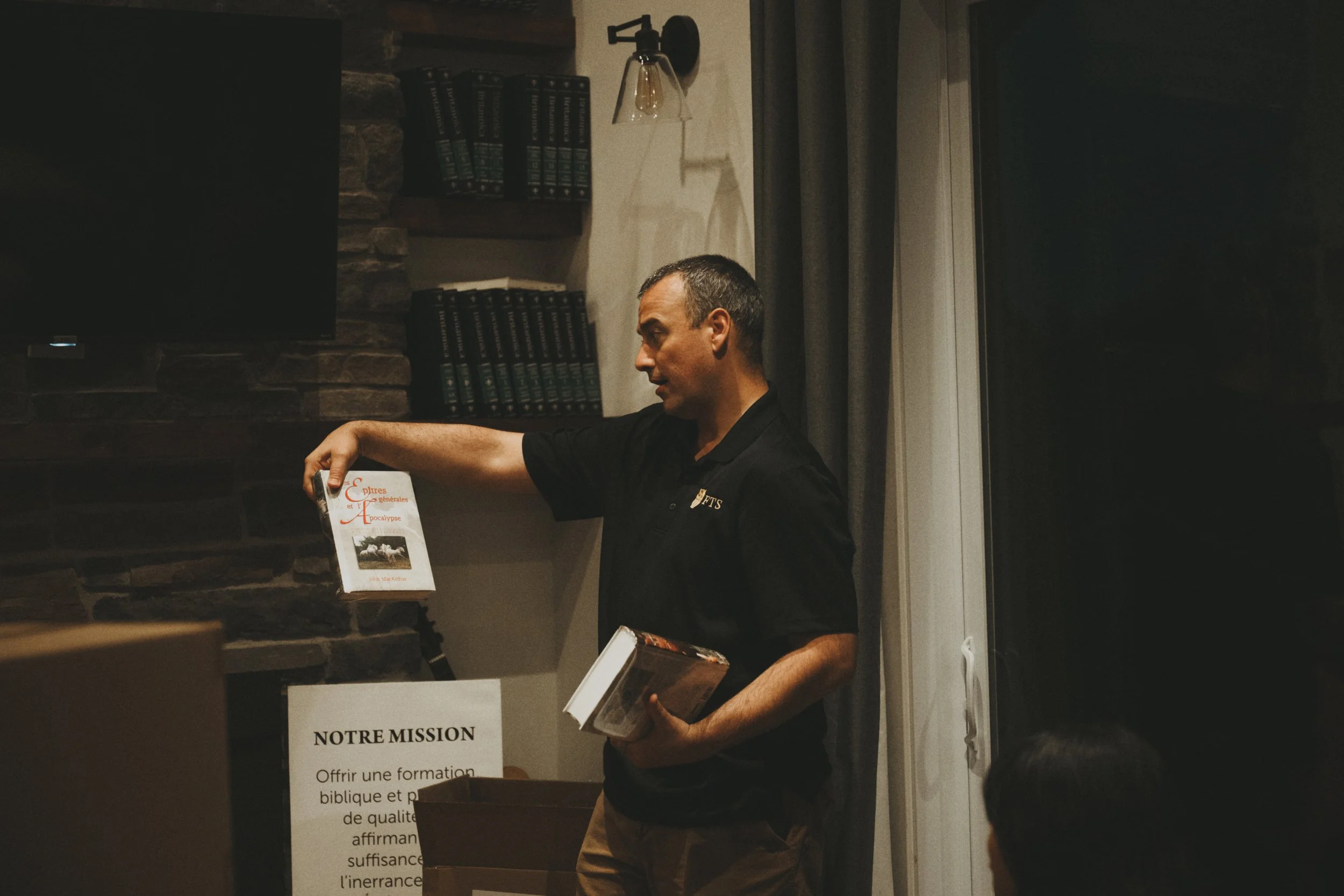Canada (French-Language)
Faculty of Scriptural Theology
MEMBER SCHOOL
Number of Graduates: 2 | Churches Impacted: 7
To provide strong biblical and practical training, affirming the sufficiency and inerrancy of the Scriptures.
MISSION
KEY DETAILS ON FACULTY OF THEOLOGY SCRIPTURA
About
-
We exist to train leaders (pastors, preachers, biblical counselors), robustly rooted in the Scriptures, to serve local churches in the French-speaking world.
-
Train pastors and biblical counselors with sound theology
We focus on forming leaders who are deeply grounded in the Word of God, capable of expository preaching and applying biblical truth in pastoral care and biblical counseling.
Strengthen partnerships with churches for robust training
Through our church campus model and coaching system, we collaborate closely with local churches to ensure that training is both academically rigorous and practically relevant.
Promote biblical ecclesiology and healthy church leadership
Our programs emphasize the local church as central to God’s mission, training students to serve with integrity, humility, and theological clarity in leadership roles.
Support biblical continuing education for existing pastors
FTS serves not only young aspiring leaders but also current pastors into ministry, offering flexible pathways for robust theological formation.
-
FTS offers a flexible and robust academic model that includes one-week in-person or online intensive courses (or two weeks for language courses), as well as both full-time and hybrid formats. Online courses are delivered through our online platform, where students access video lectures, PowerPoint presentations, and additional classroom documents. Many full-time students continue serving in their local church, while being supported by three mentors: an academic mentor provided by FTS, a pastoral mentor from their local church, and a personal mentor of their choice that can sign our declaration of faith. Part-time students are guided by an academic advisor who helps them in their study. As part of their training, male students (pastoral track) have expository preaching labs. Female students can take the biblical counseling track where they have biblical counseling labs. Male students can also take the biblical counseling track if they wish. Graduation requires completion of all academic components, labs and internships.
Training
-
Bachelor of Theological Studies in Pastoral Ministry and Biblical Counseling (B.Th.): A three- to four-year program for men aspiring to become pastors and who have completed high school. Focuses on pastoral ministry in the local church, biblical languages, with rigorous biblical training for a comprehensive and precise understanding of God’s Word.
Bachelor of Theological Studies in Biblical Counseling (B.Th.): A three- to four-year program for both men and women aspiring to become biblical counselors and who have completed high school. Focuses on a strong foundation in Scripture, biblical languages, for effective ministry to those they serve in the Church.
Master of Divinity in Pastoral Ministry and Biblical Counseling (M.Div.): A three- to four-year program for men. This program includes advanced training for pastoral ministry, including exegetical and theological argumentation.
Master of Arts in Biblical Counseling (M.A.B.C.): A three- to four-year program for both men and women. This program includes advanced theological and exegetical training for counselors, with deeper engagement in major theological questions.
Dual Degree: Bachelor + Master of Divinity (B.Th.- M.Div.): A four- to five-year program for male students seeking a master’s level degree without a prior undergraduate diploma.
Dual Degree: Bachelor + Master of Arts in Biblical Counseling (B.Th.-M.A.B.C.): A four- to five-year program for both male and female students aiming for advanced counseling training without a prior undergraduate diploma.
Certificate in Biblical Counseling (issued by FCB the French Speaking Biblical Counseling Foundation): A one-year program for male and female that includes six overview courses on biblical books, one teaching course, and five biblical counseling courses.
-
Matthieu Caron, Douglas Virgint, Gilles Despins and Jean-Marie Fahmy have been working together to train pastors, preachers, counselors and leaders since 2010 under two banners: SEMBEQ seminary in Montreal and PROFAC Bible Institute in Mont-Carmel. Gradually starting in 2020, the same group of people transitioned their training under a new banner: the Institut francophone de prédication par exposition (IFPE).
In summer 2023, Jean-Marie Fahmy, in the name of the same initial group of leaders, wrote a letter of intent to TMAI to begin the membership process. It was at this moment, in the summer of 2023, that IFPE changed its name for Faculty of Theology Scriptura. Matthieu Caron, assisted by Stéphan Tessier, took the leadership of FTS. Jean-Marie Fahmy, Douglas Virgint and Gilles Despins are all still actively involved in FTS, whether as board members or teaching faculty.
FTS is also working in very close partnership with Grace to You Canada, the French Speaking Biblical Counseling Foundation (FCB) and Publications Chrétiennes, Matthieu Caron, Jean-Marie Fahmy and Douglas Virgint being in the leadership of those partnering organizations. Our counseling school started informally in operation in 2010 (under no banner at the time).
Publications Chrétiennes started their operation in 1958 and are thrilled to have translated more than 80 books of John MacArthur in French over the years, and Grace to You Canada started their operations in 1969.
-
FTS envisions a growing network of church-based theological training campuses across Quebec and France. In the coming years, we aim to establish new partner churches that will serve as local centers for biblical training, enabling students to be trained directly within their ministry context. Our goal is to equip faithful pastors and biblical counselors who are deeply rooted in Scripture and actively serving in their churches. We seek to strengthen the church in the French-speaking world by making sound biblical training available.
Context
-
Population: 38,794,813 (2024 est.)
Ethnic Groups: Canadian 15.6%, English 14.7%, Scottish 12.1%, French 11%, Irish 12.1%, German 8.1%, Chinese 4.7%, Italian 4.3%, First Nations 1.7%, Indian 3.7%, Ukrainian 3.5%, Metis 1.5% (2021 est.)
Note: Percentages add up to more than 100% because respondents were able to identify more than one ethnic originLanguages: English (official) 87.1%, French (official) 29.1%, Chinese languages 4.2%, Spanish 3.2%, Punjabi 2.6%, Arabic 2.4%, Tagalog 2.3%, Italian 1.5% (2022 est.)
Religions: Christian 53.3%, Muslim 4.9%, Hindu 2.3%, Sikh 2.1%, Buddhist 1%, Jewish 0.9%, Traditional (North American Indigenous) 0.2%, other religions and traditional spirituality 0.6%, none 34.6% (2021 est.)
Refugees and Internally Displaced Persons
Refugees (Country of Origin): 22,400 (Venezuela) (refugees and migrants) (2020); 5,254 (Iran) (mid-year 2021)
Stateless Persons: 4,323 (2022)Stats from CIA.gov
-
Originally colonized by both the French and English alike, Canada became a self-governing dominion in 1867 under the sovereignty of the British Crown. In 1982, the nation formalized its constitutional independence from the UK with the Canada Act. The nation has developed alongside the U.S. in economic and technological advancements. Canada remains committed to environmental sustainability while exploring alternative energy sources. Political challenges faced by the government include public demands for improvements in the quality of health care, social services, and education. The dominant religious influence is Catholicism, especially in Quebec, where it has a historical but declining heritage. Evangelical Christians face challenges from an increasingly secular culture. Canada has the highest immigration rate in the world—adding to the religious fragmentation of the nation’s population.
Compiled from CIA.gov, Operation World, and Joshua Project
HOW TO PARTNER










